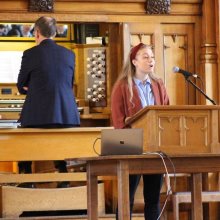
Whilst International Women’s Day has been celebrated in the Girls’ Division of Bolton School for some time, this was the first year that Boys’ Division pupils celebrated the cause.
In a whole school assembly, Headmaster Mr Ford lauded Andy Murray for his calling out of sexism in sport before Miss Roddy delivered a powerful reflection on how we can create a better society through striving for gender equality. She told how, in order to make meaningful progress, men and boys must be positively engaged in the debate. This, in turn, she said, will help further the equality agenda for women and girls. Miss Roddy told her audience that as bright, educated young people who will one day grow up to lead companies, teams, schools, their teachers want to help them to recognise the importance of gender equality, and to feel empowered to help further it.
Miss Roddy introduced the word ‘feminism’ and spoke about what it meant to her and other teaching colleagues. For her, it was about progressing women’s rights and improving matters for the next generation. She explained that for Mr Ford it was about actively promoting equality because he does not want to live in an unjust world. She referenced how he had recently been approached by a national newspaper and a national conference to talk on topics that he felt there were women much better qualified to speak about. Instead of taking the money, he encouraged the organisers to approach the people best qualified for the job.
Miss Roddy told how, for another colleague, Mrs Ryder, the key word was ‘equality’ as she considered the question as to why should being born a woman or a man make a difference? If we consider it at a most basic of levels, she said, it should be about wanting the very best people in roles, regardless of sex. She also spoke about another teacher, Mr O’Toole, who defined himself as a feminist. He thought the biggest misconception among boys – and that he was probably guilty of this as a teenager - is thinking that feminism is an attack on men and masculinity. But, he said, he had come to realise that the idea that women’s rights are gained at the expense of men’s is actually the opposite of the truth. In his view, men benefit greatly from gender equality and, because of that, it is their job to help to dismantle that privilege and to ensure the improvement of the position and status of women in society.
Miss Roddy went on to talk about feminism within school, saying that: ‘For us as a community, it means hope. It means that we can deliver the same messages in the Girls’ and Boys’ Divisions: both girls and boys can aspire to become doctors, nurses, lawyers, teachers, scientists. Both girls and boys can show emotional vulnerability and see this as a sign of strength.’ She said that ‘achieving gender equality is not a zero-sum game: women gaining more rights, freedoms and leadership positions is not about taking those away from men. It is about redressing the balance. Women make up half the world’s population. It stands to reason that they should also make up 50% of CEOs, board members, headteachers and world leaders.’
She also reminded the boys that: ‘In the wake of the Black Lives Matter protests, we learnt that it was not enough to be non-racist, we need to be actively anti-racist. In a similar way, it is not enough to be non-sexist, we have to be actively anti-sexist. We must all call out sexism and inequality when we see it. Question the status quo. Be an ally in whichever way we can.’
During the course of the week, boys also celebrated women in their year group assemblies, as well as through subsequent pastoral lessons.
Y7 boys drew inspiration from the @OnThisDayShe project as they considered the exclusion of women from recorded history. Pupils in Y8-13 considered the achievements of women in sport, including the progress made and barriers that they still face. They also took part in discussions around the negative impact of gender stereotyping on men’s mental health.
In the same week, Music Teacher Miss Sherry delivered an assembly to Y8 boys telling them about the slow progression, beginning in 1913, of allowing women to play in orchestras and how, even to this day, it is very rare for them to make up 50% of the ensemble. A recent study, she told boys, found that 98% of the music performed by major orchestras was written by male composers and that 85% of conductors are men. She related an interesting development by some European and American orchestras that had started undertaking blind auditions, whereby performers played behind a screen. Researchers determined that this made it 50% more likely that a woman would advance to the final stages of selection. She also said that within music there is often stereotyping around who plays what instrument – with men more likely to play brass instruments and women more likely to play flute and harp. Reinforcing the message of the week that gender bias helps no-one, she opined that it is important that we change things so that people can play whichever instrument they prefer the sound of!
Senior School boys also watched a video recorded by former pupil Hannah Sutcliffe (Class of 2011), who is founder of MOONHUB, a VR training company, in which she answered questions they had sent in about her career as a woman in the tech industry.
You can watch the recording of the whole school assembly here.
You can watch a recording of Hannah Sutcliffe talking about a career in the tech industry here.























